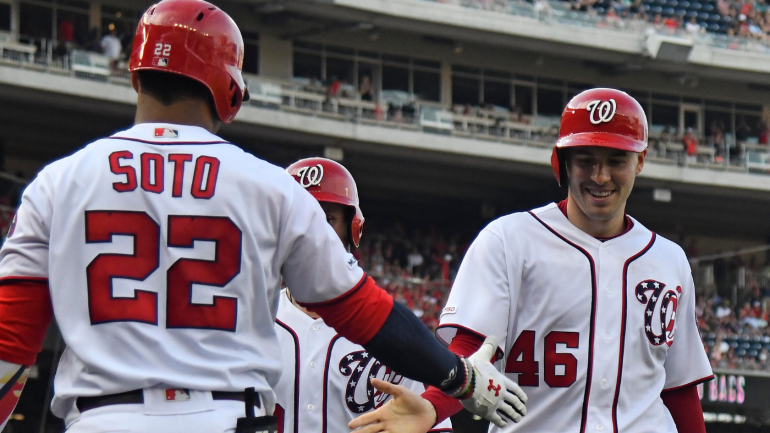
The Washington Nationals have begun engaging in trade talks involving outfielder Juan Soto, according to what sources have told CBS Sports. The Nationals' newfound willingness to entertain proposals for Soto ahead of the Aug. 2 trade deadline is precipitated by his rejection of a 15-year, $440 million extension offer. When Soto is moved, be it at the deadline or over the offseason, rival front offices who have spoken to CBS Sports expect veteran left-hander Patrick Corbin to be included in the deal.
Corbin's incorporation into a Soto trade would serve two main purposes by 1) balancing the value equation and 2) clearing more money off the books ahead of the Nationals' potential sale. Let's break down what those mean using handy subheads.
1. Balancing the value equation
The reality of trading Soto is that obtaining what feels like equal (or thereabout) value for him in the form of other players is nearly impossible. He's a 23-year-old outfielder on a Hall-of-Fame track who will be under team control for three more playoff runs. Even if a contender doesn't extend him into his free-agent years, or beyond the 2024 season, they'll be employing one of the best players in the game at submarket wages. That should bring back a ton in return, but teams these days have a tempered view of what they're willing to concede in trades, even for young superstars.
"We assign dollar values to everyone now," a talent evaluator in a rival front office said to CBS Sports. "You can project the value Soto will produce in [2022-2024] and get that in one or two high-end players with five-plus years of control."
Tacking Corbin onto Soto is a way for the Nationals to get a better deal, but not in the conventional "the other team will then add more to their side" sense. Rather, Corbin has been a well-below-replacement-level pitcher over his last 50 starts, amassing a 5.84 ERA (68 ERA+) and a 2.46 strikeout-to-walk ratio. He's owed an additional $60 million over the two forthcoming seasons, too. Shedding that commitment would be a win, and would help even the scales when viewed from the aforementioned cold, calculating dollars-based framework.

CBS Sports HQ Newsletter
Your Ultimate Guide to Every Day in Sports
We bring sports news that matters to your inbox, to help you stay informed and get a winning edge.
Thanks for signing up!
Keep an eye on your inbox.
Sorry!
There was an error processing your subscription.
Punting Corbin would also free up innings for youngsters or interesting reclamation projects, a lesser (if valid) consideration for the Nationals, who remain years away from being competitive based on their roster and the consensus of their farm system.
It's fair to question the wisdom of attaching Corbin's contract to Soto, but bear in mind that it's become a common practice. The Boston Red Sox and Cleveland Guardians both attached pitchers owed decent coin (David Price, Carlos Carrasco) when they traded away Mookie Betts and Francisco Lindor. Those situations aren't exact parallels, but they're as close to recent precedent as one will find here.
Of course, there's another reason the Nationals would be motivated to move Corbin.
2. Clearing money off the books
From a normal person's perspective, having Soto on the roster makes the Nationals a more attractive club. The goal is to win games and to field an entertaining product, and he helps in both respects. Sports owners are not normal people, and they certainly don't view these franchises through the same lenses.
The Nationals' next prospective owner, whomever that may be, would likely view a long-term extension for Soto as a negative. The franchise values are such these days that an owner either has to be ungodly rich (à la Steve Cohen) or they have to be rich and leveraged up to their eyeballs in order to cut the check. To the latter, paying a single player nearly $500 million over the next 15 years is an undesirable burden to take on.
That's why teams tend to cut costs ahead of a looming sale, and that's why the Nationals have greater incentive -- not just to refuse to up their offer to Soto into a realm where he'd accept it, but to dump as many future commitments as possible.
To be fair, the Nationals don't have many of those. Corbin is one of two Nationals with guaranteed salaries next season: the other is Stephen Strasburg, who has more than $140 million remaining and who has started eight times in the Pandemic Era. Executives with other teams expressed doubt that anyone would take on Strasburg's deal, and noted that he has the right to veto any trade using his 10-5 rights -- that is, 10 years of big-league service time with the last five coming with his current club.
Moving Corbin as part of a Soto trade, then, is the best chance to clear the books as much as is realistically possible. It shouldn't be the main consideration, not given the franchise-altering stakes of trading a player like Soto, but it matters on some level.
"trade" - Google News
July 22, 2022 at 11:23PM
https://ift.tt/IUprtzw
Two key reasons why a Juan Soto trade could likely include Nationals lefty Patrick Corbin - CBS Sports
"trade" - Google News
https://ift.tt/q12jdRQ
Tidak ada komentar:
Posting Komentar